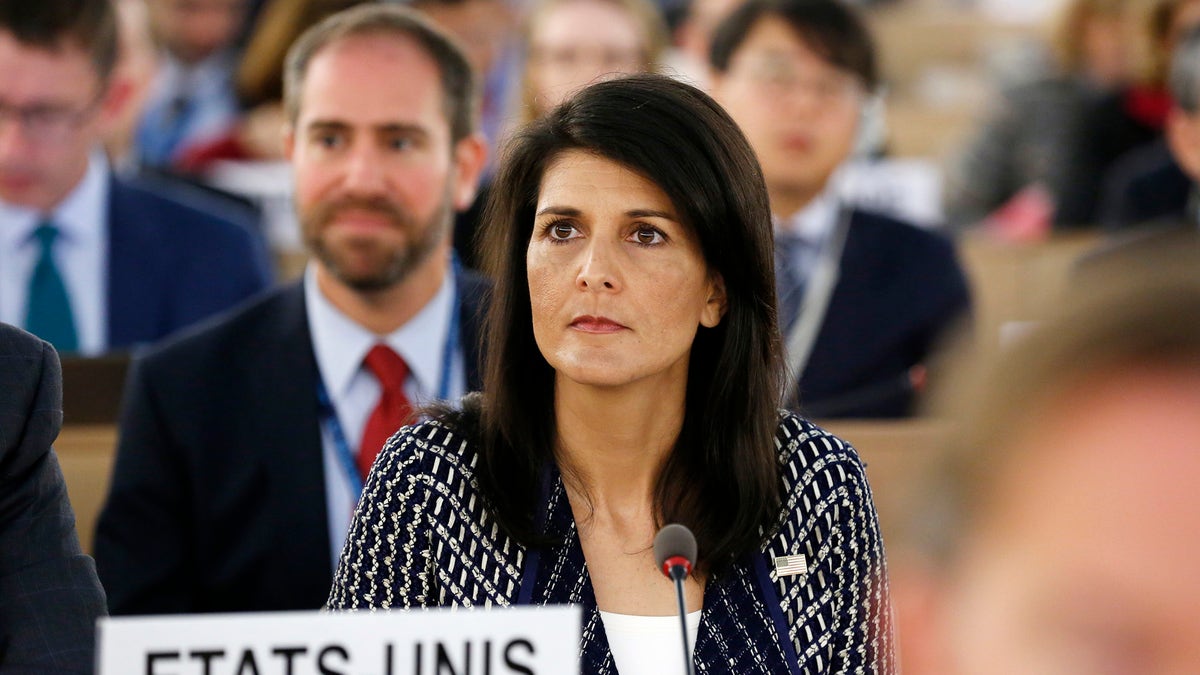
United States permanent Representative to the United Nations Ambassador Nikki Haley waits before delivering a speech about the current humanitarian situation in the world, during the opening of the 35th session of the Human Rights Council, at the European headquarters of the United Nations in Geneva, Switzerland, Tuesday, June 6, 2017. (Magali Girardin/Keystone via AP)
U.S. Ambassador to the United Nations Nikki Haley on Tuesday issued a tough warning and a short list of changes that “are the minimum necessary to resuscitate” the notorious U.N. Human Rights Council—a 47-nation, that includes China, Cuba, Saudi Arabia and Venezuela among its members, and which singles out Israel for condemnation.
But Haley, the first U.S. Ambassador to the U.N. to address the Geneva-based body, stopped short of an outright threat of withdrawal if change is not forthcoming, and made most of her demands for change during a later speech at a nearby university rather than before the Council itself, which tamped down the possibilities of diplomatic uproar.
NIKKI HALEY'S CHALLENGE: UN MEDDLING IN OUR ELECTION AND UN 'HUMAN RIGHTS'
There was no doubt, however, that Haley meant business, as she declared at the Graduate Institute of Geneva that the Council’s inaction on a wide range of human rights abuses mean that it has “failed,” which “re-enforces our growing suspicion: that it “is not a good investment of our time, money, and national prestige.”
Among other things, she demanded that the Council “must act to keep the worst human rights abusers from obtaining seats” via an essentially rigged system of regional representation, and choose members in an open vote rather than through secret balloting to that the rest of the world knows who is supporting human rights violators for membership.
Haley also demanded that the Council abolish its permanent Agenda Item Seven, which calls for regular examination of the human rights situation in “Palestine and other occupied Arab territories,” which serves as a regular forum for diatribes against Israel. No other country is selected by the Council for such treatment.
As one result, Haley noted, “the Council has passed more than 70 resolutions targeting Israel. It has passed just seven on Iran. This relentless, pathological campaign against a country that actually has a strong human rights record makes a mockery not of Israel, but of the Council itself.”
NIKKI HALEY SAYS SYRIAN REGUGEES SHE MET DURING OVERSEAS TRIP 'WANT TO GO HOME'
What the U.S. would do if the Council failed to act, however, was mostly left unstated. Haley declared only that “the U.S. will not sit quietly while this body, supposedly dedicated to human rights, continues to damage the cause of human rights.”
During her earlier speech at the Council, where she invited members to her Geneva Institute oration, Haley confined herself to observing diplomatically that the U.S. government “is looking carefully at this Council and our participation in it,” and sees “some areas for significant strengthening” that would make the body “more effective, more accountable, and more responsive.”
She also said it was “crucial” for the Council to pass “the strongest possible resolutions on the critical human rights situations in Syria, the Democratic Republic of the Congo, Eritrea, Belarus, and Ukraine,” and specifically called for the increasingly brutal Marxist government of Venezuela to “voluntarily step down from its seat on the Human Rights Council until it can get its own house in order.”
Underlining the last point, Haley also attended a U.S. sponsored side event at the Human Rights Council session that gathered an array of human rights activists and academics to decry the Venezuelan government’s crackdown on waves of protest against the regime of President Nicolas Maduro.
“The Venezuelan government is in the midst of destroying human rights and democracy in Venezuela,” she said at the event.
Then she added, after once again noting Venezuela’s Human Rights Council membership: “The Human Rights Council has no excuse. It cannot consider itself the world’s leading human rights organization and continue to ignore the violations and abuses that are occurring in Venezuela.”
In the past, however, the Council has shown that it can. Whether the group will take Haley’s extremely strong hint to heart, along with her other minimal demands for reform, remains to be seen.




